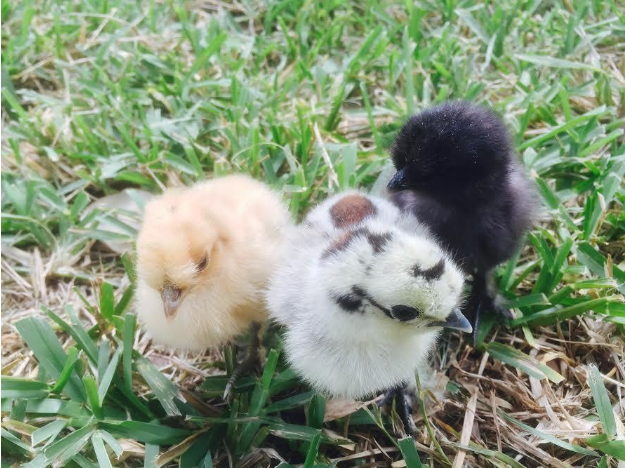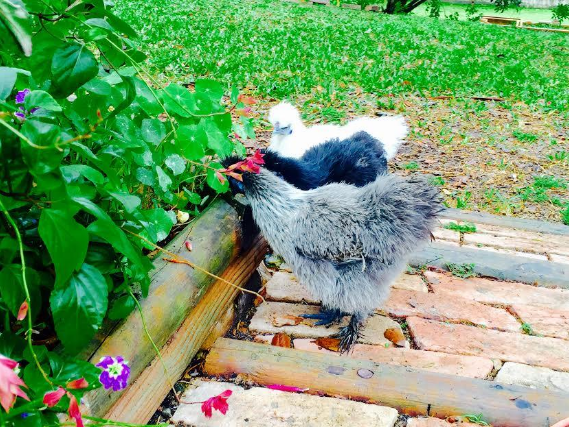Having backyard chickens in urban neighborhoods is becoming more of a trend with each changing of (gardening) seasons. While many may think that having some hens running amuck in their gardens sounds like a lot of work or perhaps that they may not have enough room to keep them happy, the truth is that having some feathered ladies in the garden may take a lot of work off of your hands – and only about five square feet of space per chicken is required to keep everyone happy territorially.

Gills’ employees from Left to Right: Kady, Emily, Josh, all have backyard chickens of their own
The three main benefits of keeping backyard chickens, in my opinion, are as follows:
- Natural Pest Control – Chickens absolutely love finding and eating bugs! When allowed to free range in your yard, you will find chickens scratching the ground to look for worms (and a lot of happy squawking if they find a chunky little grub worm!), and you will see your chickens sprinting around chasing mosquitos to grab out of the air. Not only is it eternally entertaining to watch the girls on bug-duty, it is extremely beneficial to your garden and to the peacefulness in your yard. I have watched chickens eat grasshoppers, worms, moths, fleas, snakes, ticks, aphids, scorpions, mosquitos, grubs, spiders, ants and termites. The girls will eat pests of any life-cycle including egg, larval stage and adults. This helps to keep the garden pest populations down which means less spraying that you have to do. The key is to allow your girls to have access to your gardens during the right times of the year. For example, you should not let your chickens in your garden if you have small seedlings growing as they may scratch them or sit on them accidentally. Keep your garden protected until the plants are established. And again, if you are growing fruit or vegetables, do not allow your chickens to reap the benefits of fresh food before you can! Do allow your chickens to roam through your freshly tilled garden as they will scout out the weed seeds to eat before they have a chance to sprout.
- Natural Fertilizer – Chicken fertilizer is very beneficial if used responsibly. It is naturally extremely high in Nitrogen which could cause it to burn your plants if you do not allow it to sit for an amount of time. The easiest way to apply chicken fertilizer is to keep it mixed with your chicken’s bedding such as straw, hay or shavings. These are compostable materials and can be added to your garden in the way you would add any other compost or amendment. You have to clean their coops anyway so you might as well put it to good use in your garden! Another great assistance is the egg shells from your chicken’s bounty being used in your garden can add calcium and enrich the soil. When you crack the eggs, wash out the egg shells and allow them to dry. Then simply break them up and add them to your already-dug planting holes in your garden.
- Urban Composting – I understand all of the benefits of having a compost bin but simply cannot keep one as A) I cannot stand the smell (and I don’t think my neighbors would appreciate it either and B) the bugs that are so attracted to the compost bin are a major turn off for me. I have always felt guilty throwing away table scraps and fruit/veggies that have gone off before having the chance to eat them. The chickens are living compost bins willing and able to take all of this guilt off of your hands! They are omnivorous so they can eat meat (although I do not condone feeding them chicken for obvious reasons) and they will eat just about anything else that you have had for dinner – with the exceptions of a few foods being unhealthy and poisonous for them to eat such as: candy, chocolate, sugar, raw potato peels, avocado skins and pits, raw or undercooked beans, salt and citrus along with a few various other items. Of course it is always a good idea to do a quick google search before feeding an animal anything that you are unsure of what the effect will be.

Enjoying the girls in the lower gardens at Emily’s house.
Raising your backyard chickens from day old chicks, in my opinion, is the most rewarding way to keep chickens. This gives you a chance to handle them from the time they are very young which makes them used to you, giving you a pet-like relationship with your backyard flock.

5 day old Silkie chicks
When you bring your new chicks home, you must keep them very warm at 95* F for the first week of their life and drop 5* F each week until they are maintained at regular daytime temperatures. The best way to do this is to keep a bulb and a thermometer in their coop. Of course it is important to practice proper safety methods with this such as not allowing the bulb to touch any surface in the coop and turning it off frequently to let it cool down.
Your new chicks will require a special type of feed called chick starter. You can purchase this medicated or unmedicated. The choice is yours, however, if you choose unmedicated you must diligently pay attention to the cleanliness of your coop and the distinct signs of health of your new chicks. Any unusual activity from one of your girls should be investigated immediately. Any symptoms can be found through a beginner chicken guide book or an online google search. www.backyardchickens.com is an excellent source of information and a great place to post questions/pictures of what’s going on in your flock. A trick that I have found helpful is to add a capful of organic apple cider vinegar to each gallon of water that your chicks drink. This helps to keep them drinking regularly as they like the taste and it also helps to keep them flushed out. Hens begin laying eggs between five and six months old. After three years of age, their laying rate begins to drop to one less egg per week.
The safety of your chickens should be your biggest concern when keeping backyard chickens. You must have a fenced-in yard if you want your chickens to free range, and even then they can take flight high enough to get over your fence. Fortunately, your chickens will not try to leave unless they are missing something that they need in your yard. If you have plenty of food and water, this should not happen. Next, you want to be sure that no outside predators can get into your yard, or your coop. In Corpus Christi, other than maintaining a safe coop, the concerns of predators are typically raccoons, opossums, coyotes, wild dogs, hawks and migratory birds. Be sure that your chickens have plenty of options to run to safety in a covered, hard to reach area to hide from predators that might have set their sights on your birds. The last safety concern is one that you may not immediately think of: your pet dogs and cats. If your pets go outside to roam around in your yard, you must remember that their first instinct is to hunt. You absolutely cannot leave your chickens out unprotected in your yard with your dogs. You must have an area to keep them safe and separated.
Some chicken fun facts:
- Chickens do not have teeth. They have a gizzard that has tiny stones which grinds up the food that they swallow whole.
- Chickens lay between 100 and 300 eggs per year, at a rate of one per day. The eggs are only fertilized if there is a rooster around.
- Chickens begin communicating before they are born. The Momma Hen makes a purring sound to her unhatched eggs and the chicks can begin peeping back to her while they are still inside the eggs.
- Chickens know who you are – they can learn up to 100 different faces.
- Chickens have prehistoric roots. They are believed to be the closest living ancestor of the Tyrannosaurus rex.

Three Silkies enjoying the nasturtiums.
 -Emily Capule
-Emily Capule



Richard says
LOVE this information and keep up the good work.
The Ubbinks